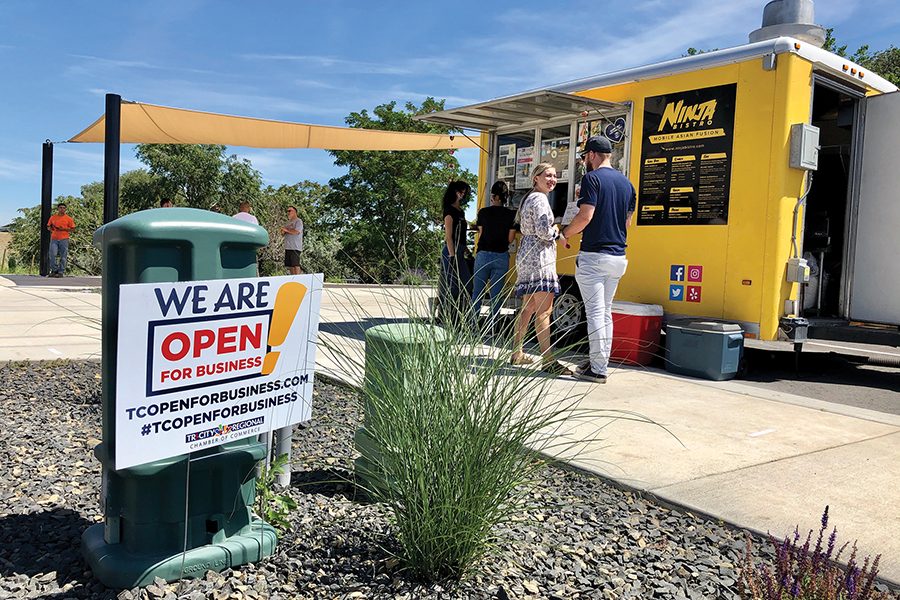
Home » Pandemic puts commercial real estate on pause in the Tri-Cities
Pandemic puts commercial real estate on pause in the Tri-Cities

August 14, 2020
John Corbin is not happy.
The Tri-City Chuck E. Cheese restaurant, a franchise he’s helmed for 38 years, closed in March when Washington Gov. Jay Inslee issued the Stay Home, Stay Healthy order to curtail the spread of coronavirus.
Just 16 months earlier, he’d moved Chuck E. Cheese to a 14,000-square-foot state-of-the-art building near Kennewick’s Vista Field, built at a cost of $4 million.
Five months later, it’s still closed. Its 50 to 60 employees stayed on at first, courtesy of the CARES Act’s Paycheck Protection Program loan, which covered salaries and other costs. They spent their time cleaning and painting the new building until the money ran out.
He wonders about his ability to reopen if inside dining doesn’t return to Benton County.
“I have all my money invested in this and now I’m put out of business by the governor,” he said.
The family-friendly restaurant is one of the many Tri-City businesses that remain dark during the pandemic, with futures that increasingly are being called into question.
Local brokers agree the pandemic is taking its toll but offer an optimistic view that the commercial “pause” will give way to a solid recovery across all types of nonresidential commercial property — retail, office, industrial and even land sales.
“I can’t tell you when we’re going to get back to normal. But once indicators are back, our market is going to take off. That will happen nationwide,” said Rob Ellsworth, senior adviser for SVN Retter & Co., a commercial real estate firm in Kennewick.
Ellsworth focuses on leasing and sales of all commercial property types, working chiefly in the Tri-City area.
Conditions are ripe for a restart, he said.
The Tri-City commercial real estate sector had a strong year in 2019 with solid leasing and sales in all product types, particularly industrial.
Vacancy rates were tight, leasing was up, rents were rising, and business owners were looking for land to expand. Capitalization rates, or “cap rates,” were dropping too, a sign of tight inventory and rising demand for space.
A cap rate is the rate of return on a real estate investment.
In short, 2020 was going to be a good year.
Like most, Ellsworth was shocked by the Stay Home, Stay Healthy order in March.
“I don’t think anybody expected anything that drastic. In your lifetime, no one has ever experienced anything like this,” he said.
Despite the challenges, retailers are staying current on rents, according to brokers and property owners.
But that could be changing as the Paycheck Protection Program concludes and money runs out.
“I haven’t heard of any business saying they need out of the lease,” he said.
He’s more concerned about the office market. The pandemic forced employers to embrace working from home. He predicts some will embrace it beyond the pandemic and give workers the choice to say home.
That could reduce demand for office space.
“I think your typical office user will go to a smaller footprint,” he said, explaining that if an employer reduces their office need by 20%-30%, they can cut their 5,000-square-foot office to 4,000.
“That could be a hiccup for (building) owners, he said.
Office managers will reevaluate their needs, according to a Covid-19 study by Colliers International, a global real estate firm. The July “Office Space in the Post-Covid Era” report predicts a sharp but short recession.
For the first time in 10 years, tenants leased less space than they gave back in the second quarter, known as “negative absorption” in the industry.
“The COVID-driven work-from-home experience has shown that remote work is here to stay,” it said. “Both employees and their managers see the benefits. The office will become more of a destination that will attract workers to what the office does best: gathering, knowledge transfer, onboarding, social interaction and connection to the brand, culture and mission.”
Pandemic jitters slowed but didn’t stop investors from buying commercial properties. David Fritch, broker with Kenmore Team, reports deals that were in the works closed, but not on their scheduled dates.
“Big transactions in April became big transactions in June,” he said.
He closed a building sale with a 1031 exchange, a tax-advantaged maneuver that allows buyers to defer capital gains by investing in comparable real estate. Fritch said 1031 is more important than ever — it keeps money working instead of sitting on the site to wait out the pandemic and economic fallout.
In another case, a buyer paused to reconsider tying up cash in real estate, then moved ahead with his plans.
He too is an optimist, saying that creative endeavors will come from the crisis.
“I don’t see a bleak picture of business in the Tri-Cities,” he said, adding, “I would not want to be in retail.”
Local News
KEYWORDS august 2020




